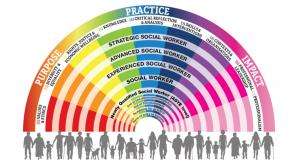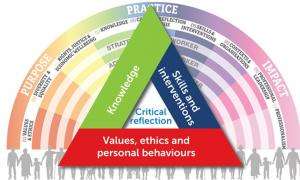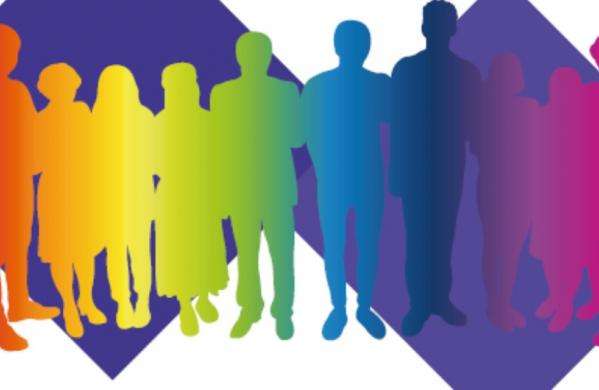Introduction
This Capabilities Statement for Social Workers Working with Adults with Learning Disability (the Capabilities Statement) has been commissioned by the Department of Health and Social Care for England and developed by the British Association of Social Workers (BASW) with input from Research in Practice for Adults (RiPfA). It is landmark guidance filling a longstanding gap in this vital field of social work.
There are over 1.5 million people with a learning disability in the UK and the number is growing. Social workers support people with lived experience of learning disabilities in all fields of practice – in children and families and adults social care services, in hospital and community contexts as well as in specialist learning disability services. Generic social work capabilities are the essential foundation to good practice and good experience for citizens. Deeper knowledge and more specialised approaches are also needed, particularly in tackling the inequalities and poor services that people with learning disabilities often experience.
Social work values, ethics and skills are key to ensuring personalised care and support, human rights-based practice and robust advocacy are available for people with lived experience of learning disabilities. Inadequate and sometimes abusive institutional services are still being experienced by people with learning disability. Confident and effective social work is essential within multidisciplinary services and commissioning to accelerate improvements in the quality of care and support. Social workers need the capabilities to ensure community-based support is planned and provided, maximising people’s potential for independence and self-determination, living the lives they want. This Capabilities Statement supports this vital social work contribution.
This Capabilities Statement is accompanied by a Continuing Professional Development (CPD) pathway and supporting resources (on the BASW and DHSC websites). These provide a practical framework to promote improvement of practice and positive impact of social work in this field.
"I have found that that capabilities statement has been very beneficial in enhancing my social worker practice and knowledge base when working with people with learning disabilities/ difficulties and Autism, in terms of reflective practice in recognising strengths and empowering people, for best approach for best outcomes, rather than making assumptions based on diagnosis. Furthermore I have been able to apply this to my practice to bring about the best outcomes for the individuals that are allocated to me to work with." Lucia Paul, Adult Social Worker - Learning Disabilities & Autism Team
Methodology
The Capabilities Statement was developed between October 2018 and March 2019 through literature review, consultation and involvement of stakeholders. The work was overseen by a Stakeholder Reference Group which included people with lived experience, their family, friends and carers, social workers, managers and academics. Principles of co-production, meaningful involvement and giving equal value to most marginalised voices were central throughout.
Consultation with a wide variety of stakeholders was undertaken through:
- An online survey
- Consultation and involvement discussions with people with lived experience via existing services and service-user led groups and organisations
- Deep-dive discussions/interviews with key stakeholders.
The Capabilities Statement is also informed by the evidence base from research and practice. A literature review that informed this work can be downloaded on the BASW website). Key references and a short bibliography are included in this document.
Who is this practice guidance for?
The Capabilities Statement provides guidance for professionals, managers and other stakeholders involved in delivering social work and social care with people with lived experience of learning disability. It outlines expected practice standards for social work. It will also be useful for people with lived experience of learning disability and their families to know what to expect from social workers.
The Capabilities Statement is particularly aimed at supporting:
- Social workers – to explore and understand capabilities associated with good practice in generic and specialist services; to promote the human rights, ethics and values driven purpose and practice of social work in this field and to frame social work CPD priorities to improve the practice and impact of social work
- Higher Education Institutions, researchers and providers of social work training – to develop and deliver curriculum content; plan the involvement of people with lived experience in teaching and research; develop assessment criteria and identify practice learning requirements in the qualified and qualifying workforce
- Local authorities – to develop services, effective commissioning and review capabilities and to provide learning and development for all social workers. Where services are being reconfigured (e.g. from specialist to generic or vice versa this Capabilities Statement can shape the training that social workers require)
- Managers and leaders – to inform supervision and evaluation of practice through reflecting on components of the Capabilities Statements, to support recruitment and retention of staff and to inspire effective practice, organisational and systems leadership for excellence
- Practice Educators and University Staff – for teaching and assessing students’ capability and suitability in practice with people with lived experience of learning disability.
Although aimed primarily at practice with adults, this guidance is also applicable to children’s services in a number of ways including:
- People with lived experience of learning disabilities may be parents and may encounter social workers in their own right, or their children may have social workers
- Young people with learning disabilities often require support in the transition to adulthood and there will be an overlap between children and adult services at this point
- The new Liberty Protection Safeguards, part of the Mental Capacity Act 2005, apply to people aged 16 and above, requiring social workers in children and families to have more capability in this area of law and practice.
Links with the Professional Capabilities Framework and Knowledge and Skills Statements
The Capabilities Statement is framed by the Professional Capabilities Framework (PCF). It also supports social workers to meet the expectations of the Chief Social Worker for Adults( in England) Knowledge and Skills Statement for Social Workers in Adult Services.
‘Together, the PCF and KSS provide the foundation for social work education and practice in England at qualifying and post-qualifying levels and are used to inform recruitment, workforce development, performance appraisal and career progression.
The PCF guides the development of social workers’ capabilities and confidence in managing risk, ambiguity and complexity at nine levels of practice across all specialisms…. The KSS set out what a social worker should know, and be able to do, in specific practice settings, in specific roles and at different levels of seniority’.
Originating from the work of the Social Work Reform Board, the PCF outlines the generic capabilities that underpin all social work practice in England.
There are nine domains of capabilities in the PCF grouped under three overarching ‘super domains’ - Purpose, Practice, Impact. As shown in the diagram below, the Domains of the PCF are: 1. Professionalism 2. Values and Ethics 3. Diversity and Equality 4. Rights, Justice, and Economic Wellbeing 5. Knowledge 6. Critical Reflection and Analysis 7. Skills and Interventions 8. Contexts and Organisations 9. Professional Leadership.

All generic PCF domains are important for social work with people with lived experience of learning disabilities. However, the Capabilities Statement defines specific capabilities that enhance and deepen social work practice with adults with this lived experience.
Levels of practice and CPD
The PCF supports CPD by identifying and promoting different levels of capability from prequalifying to Advanced and Strategic levels. The PCF describes how social workers advance their practice through working with more complexity, ambiguity and autonomy. Further description of the capabilities for social work with adults who have learning disabilities at all levels of the PCF are contained in the accompanying online CPD resources on the BASW website.
Structure of the Capabilities Statement
The Capabilities Statement is structured around the PCF ‘super domains’ Purpose, Practice, and Impact. These inter-relate, but each focus on three discrete areas of professional development.
- The Purpose section of the Capabilities Statement describes the values, ethics and approach to rights and equalities that social workers need to demonstrate to make a positive impact for people with lived experience who often experience (or at risk of) social exclusion and discrimination
- The Practice section describes the knowledge, skills and critical reflection capabilities specific to social work practice with people with lived experience of learning disability
- The Impact section shows the professionalism, organisational, leadership, and self- management skills that are needed in this area of practice.
What was most important to people with lived experience?

The diagram above illustrates the elements of social work capability that were emphasised throughout the co-production and development of the Capabilities Statement with people with lived experience, their families and professional stakeholders, particularly within the Stakeholder Reference Group.
The three sides of the triangle and its centre (critical reflection) are inter-dependent. Each dimension needs to be achieved simultaneously in practice to make the most positive difference for adults who have a learning disability.
The Capabilities Statement Stakeholder Reference Group emphasised the importance of Positive Values, Ethics and Personal Behaviours, placing this at the bottom of the triangle as the foundation of good social work. This means social workers building and sustaining positive relationships, taking time to:
- get to know people with lived experience as individuals
- listen and know how to communicate effectively
- support their family and friends
- help them lead the lives they choose
- show respect and treat them as equal citizens
Critical reflection is at the centre of the triangle. It enables social workers to use their Knowledge, Skills and Interventions (and all other elements of the Capabilities Statement) effectively. It helps social workers to plan and decide what capabilities to draw upon in each practice situation; it assists them to learn and gain further knowledge from their practice experiences; and it supports consideration and weighing up of ethical decisions and dilemmas which are often central to social work with adults with learning disabilities.
